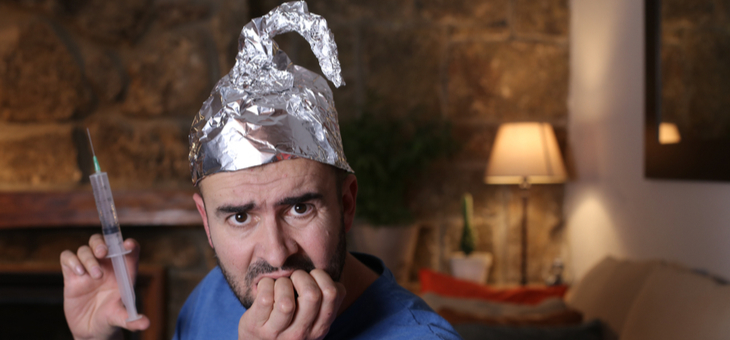The peak body for Australia’s doctors has called on the government to invest in advertising to counter health misinformation being spread on the internet and social media.
However, those calls are likely to fall on deaf ears, given that some of that misinformation is coming directly from that side of the government’s benches and acting prime minister Michael McCormack did little to rebuke the members responsible.
Liberal MP Craig Kelly, who has previously championed the use of hydroxychloroquine to treat COVID-19, posted a link to Facebook on Tuesday examining the impact of mask-wearing on children during the pandemic and likening it to child abuse.
“What other conclusion can be drawn from this first ever published study, other than that forcing children to wear masks is causing massive physical and psychological harm – that can only be defined as child abuse,” Mr Kelly wrote.
The acting prime minister refused to criticise the post and defended the right to post the information.
“Facts sometimes are contentious and what you might think is right, somebody else might think is completely untrue,” Mr McCormack said. “That is part of living in a democratic country.”
The Australia Medical Association (AMA) released its position statement on health literacy this week and its president, Dr Omar Khorshid, explained that the plethora on information online about health and wellbeing was confusing for many people.
“Health literacy is critical to people making informed choices about their health and healthcare and living longer, healthier lives,” Dr Khorshid said. “Many groups in our community already have lower levels of health literacy – people with lower levels of education, from cultural and linguistically diverse backgrounds, people who are unemployed, people with disability, and people with lower socio-economic status.
“Traditionally, people have learnt about healthy choices from their families, schools, doctors, and government advertising campaigns. However, people are increasingly seeking information from websites and social media.
“Making reliable health information easily available online has positive effects on people’s health literacy.
“But the internet has the potential to significantly magnify health misinformation campaigns, as people can easily absorb misinformation delivered directly to them through advertising, celebrity influencers, and people in positions of power.
“We have seen this with the anti-vaccination movement, and the countless conspiracy theories about the COVID-19 pandemic that circulate constantly on the internet.”
Dr Khorshid praised the work of some government agencies in trying to shut down misinformation but said a more co-ordinated plan of attack may be necessary.
“The Australian Competition and Consumer Commission (ACCC) does its best to crack down on fraudulent claims about items of clothing or glorified lava lamps being able to repel COVID-19, but more action is needed,” Dr Khorshid explained.
“We need an Australian government-funded campaign to counter this misinformation and promote healthy choices, including information about vaccine safety and the health risks associated with alcohol, junk food, tobacco, and other drugs.
“Social media companies must also acknowledge their responsibility and work actively to counter health misinformation on their platforms.”
The AMA is also calling on all state and territory governments to collaborate with the federal government to extend the current Health Direct website to provide a single, accessible, national source of verified health information. The Victorian and Queensland governments currently do not contribute any funding to Health Direct.
The Consumers Health Forum (CHF) welcomed the AMA’s position statement on health literacy as an important recognition of the need for strong public support for people to have access to valid health information.
“CHF has long argued for more focus on health literacy to ensure people understand their own health and care needs, so they have the power to make the best decisions for their health,” CHF chief executive Leanne Wells said.
“In the internet era when so much good and bad information floods people’s screens, there is a need for a healthy information culture to overcome fake health news.
“We agree with the AMA that doctors, and health systems, have a vital role to play in improving health literacy by communicating effectively and sensitively with patients, encouraging discussion, and providing information that is understandable and relevant.
“We would support the AMA’s call for an Australian government-funded campaign to counter this misinformation and promote healthy choices … But to be effective the campaign must have active involvement of consumers.
“Health literacy is vital to consumers’ capacity to manage and feel in control of their health care. As one of the blueprint authors said, right now, up to 60 per cent of Australians appear to lack the capacity to access, understand, appraise and use crucial information to make health-related decisions.”
Do you think the government should do more to tackle health misinformation on the internet in the current environment?
If you enjoy our content, don’t keep it to yourself. Share our free eNews with your friends and encourage them to sign up.
Related articles:
https://www.yourlifechoices.com.au/health/covid19/how-china-is-controlling-the-inquiry-into-covids-origins
https://www.yourlifechoices.com.au/health/covid19/questions-raised-over-efficacy-of-the-astrazeneca-covid-19-vaccine
https://www.yourlifechoices.com.au/finance/is-moving-to-the-country-right-for-you

